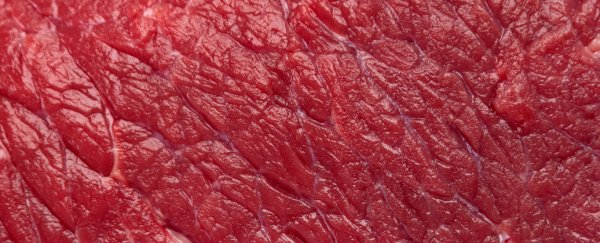Since the release of a 2007 report by the World Cancer Research Fund, there has been wide recognition by health organisations of the convincing evidence linking red meat consumption to a modest increase in the risk of developing colorectal cancer.
Something that has puzzled researchers in the past, however, is why the same heightened risk doesn't necessarily present in carnivorous animals.
Now, researchers from the University of California, San Diego (UCSD) say the answer might lie in a sugar molecule found in red meats, such as lamb, beef and pork.
This specific molecule, known as Neu5Gc, is naturally occurring in most carnivores, but not in humans – as a result, we produce anti-bodies to identify and neutralise the molecule after ingestion, because our bodies interpret it as a foreign substance.
The researchers have been looking at how Neu5Gc affects mice that have been genetically engineered to be deficient in the sugar – similar to humans.
According to the press release, the scientists found that feeding Neu5Gc to their specially engineered mice "significantly promoted spontaneous cancers". They also note that the study "did not involve exposure to carcinogens or artificially inducing cancers".
Their results were published in the Proceedings of the National Academy of Sciences on December 29th.
As the authors note at the beginning of their paper, these mice have a predisposition to developing liver cancer. When they were fed the sugar molecule, activating the antibodies, the mice "developed evidence of systemic inflammation".
Inflammation has long been linked to tumour progression. Over the long term, the paper said these mice were five times more likely to develop cancerous tumours, with the sugar molecules accumulating in these tumours.
"Until now, all of our evidence linking Neu5Gc to cancer was circumstantial or indirectly predicted from somewhat artificial experimental setups," said lead author Ajit Varki from UCSD. "This is the first time we have directly shown that mimicking the exact situation in humans – feeding non-human Neu5Gc and inducing anti-Neu5Gc antibodies – increases spontaneous cancers in mice."
"The final proof in humans will be much harder to come by," Varki said in the release. "On a more general note, this work may also help explain potential connections of red meat consumption to other diseases exacerbated by chronic inflammation, such as atherosclerosis and type 2 diabetes."
There has been research showing that a diet rich in red meat can contribute to other forms of cancer, such as breast cancer in women, and gut cancer. However, the link between red meat and cancer is still hotly debated.
In March 2014, a collective of scientists published a paper in the journal Meat Science calling for more research, and highlighting some of the pitfalls of experiments that use rodents. One of the chief criticisms is a diet that doesn't include any vegetables, fibre or calcium.
For more detailed information on the possible link between meat consumption and the development of certain cancers, have a read of the Cancer Council Australia's Position Statement on Meat and Cancer Prevention.
Source: ScienceDaily
